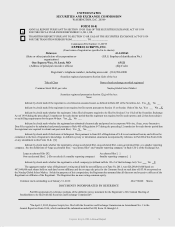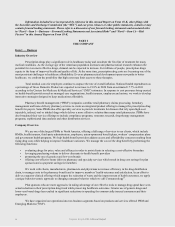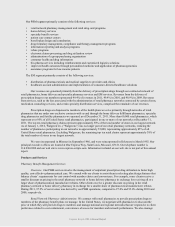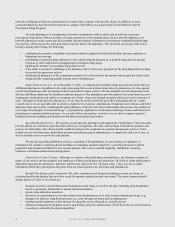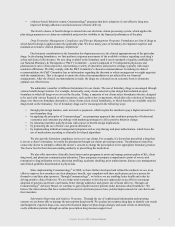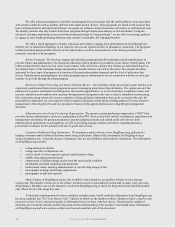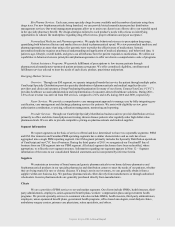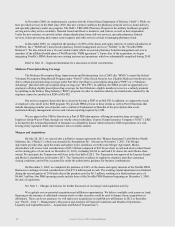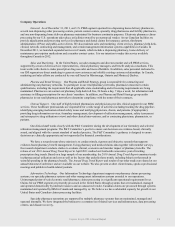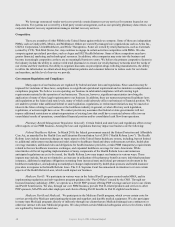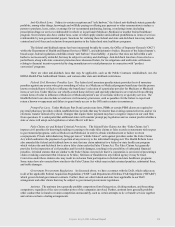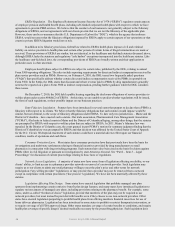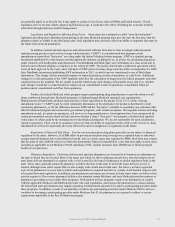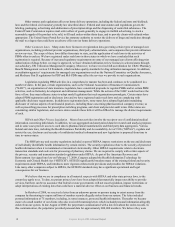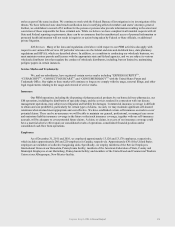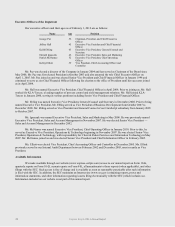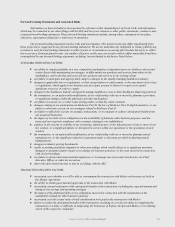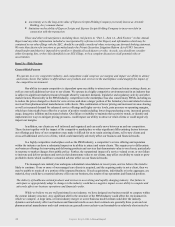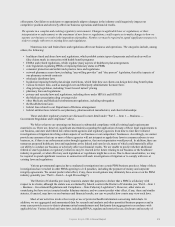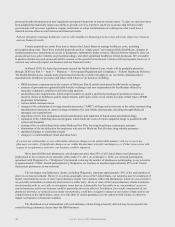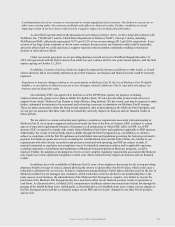Express Scripts 2011 Annual Report Download - page 17
Download and view the complete annual report
Please find page 17 of the 2011 Express Scripts annual report below. You can navigate through the pages in the report by either clicking on the pages listed below, or by using the keyword search tool below to find specific information within the annual report.
Express Scripts 2011 Annual Report 15
Anti-Kickback Laws. Subject to certain exceptions and ―safe harbors,‖ the federal anti-kickback statute generally
prohibits, among other things, knowingly and willfully paying or offering any payment or other remuneration to induce a
person to purchase, lease, order, or arrange for (or recommend purchasing, leasing, or ordering) items (including
prescription drugs) or services reimbursable in whole or in part under Medicare, Medicaid or another federal healthcare
program. Several states also have similar laws, some of which apply similar anti-kickback prohibitions to items or services
reimbursable by non-governmental payors. Sanctions for violating these federal and state anti-kickback laws may include
criminal and civil fines and exclusion from participation in the federal and state healthcare programs.
The federal anti-kickback statute has been interpreted broadly by courts, the Office of Inspector General (―OIG‖)
within the Department of Health and Human Services (―HHS‖), and administrative bodies. Because of the federal statute’s
broad scope, federal regulations establish certain ―safe harbors‖ from liability. A practice that does not fall within a safe
harbor is not necessarily unlawful, but may be subject to scrutiny and challenge. Anti-kickback laws have been cited as a
partial basis, along with state consumer protection laws discussed below, for investigations and multi-state settlements
relating to financial incentives provided by drug manufacturers to retail pharmacies in connection with ―product
conversion‖ programs.
There are other anti-kickback laws that may be applicable, such as the Public Contracts Antikickback Act, the
ERISA Health Plan Antikickback Statute, and various other state anti-kickback restrictions.
Federal Civil Monetary Penalties Law. The federal civil monetary penalty statute provides for civil monetary
penalties against any person who gives something of value to a Medicare or Medicaid program beneficiary that the person
knows or should know is likely to influence the beneficiary’s selection of a particular provider for Medicare or Medicaid
items or services. Under this law, our wholly-owned home delivery and specialty pharmacies are restricted from offering
certain items of value to influence a Medicare or Medicaid patient’s use of our home delivery or specialty services. The
Health Reform Laws also include several new civil monetary provisions, such as penalties for the failure to report and
return a known overpayment and failure to grant timely access to the OIG under certain circumstances.
Prompt Pay Laws. Under Medicare Part D and certain state laws, PBMs or certain PBM clients are required to
pay retail pharmacy providers within established time periods that may be shorter than existing contracted terms, and/or via
electronic transfer instead of by check. Changes that require faster payment may have a negative impact on our cash flow
from operations. It is anticipated that additional states will consider prompt pay legislation and we cannot predict whether a
state or states will adopt such legislation or what effect it will have.
False Claims Act and Related Criminal Provisions. The federal False Claims Act (the ―False Claims Act‖)
imposes civil penalties for knowingly making or causing to be made false claims or false records or statements with respect
to governmental programs, such as Medicare and Medicaid, in order to obtain reimbursement or failure to return
overpayments. Private individuals may bring qui tam or ―whistle blower‖ suits against providers under the False Claims
Act, which authorizes the payment of a portion of any recovery to the individual bringing suit. The Health Reform Laws
also amended the federal anti-kickback laws to state that any claim submitted to a federal or state health care program
which violates the anti-kickback law is also a false claim under the False Claims Act. The False Claims Act generally
provides for the imposition of civil penalties and for treble damages, resulting in the possibility of substantial financial
penalties. Criminal statutes that are similar to the False Claims Act provide that if a corporation is convicted of presenting a
claim or making a statement that it knows to be false, fictitious or fraudulent to any federal agency it may be fined.
Conviction under these statutes also may result in exclusion from participation in federal and state healthcare programs.
Some states have also enacted laws similar to the False Claims Act which may include criminal penalties, substantial fines,
and treble damages.
Government Procurement Regulations. As discussed above, we have a contract with the DoD, which subjects us
to all of the applicable Federal Acquisition Regulations (―FAR‖) and Department of Defense FAR Supplement (―DFARS‖)
which govern federal government contracts. Further, there are other federal and state laws applicable to our DoD
arrangement and other clients that may be subject to government procurement regulations.
Antitrust. The antitrust laws generally prohibit competitors from fixing prices, dividing markets, and boycotting
competitors, regardless of the size or market power of the companies involved. Further, antitrust laws generally prohibit
other conduct that is found to restrain competition unreasonably, such as certain attempts to tie or bundle services together
and certain exclusive dealing arrangements.


